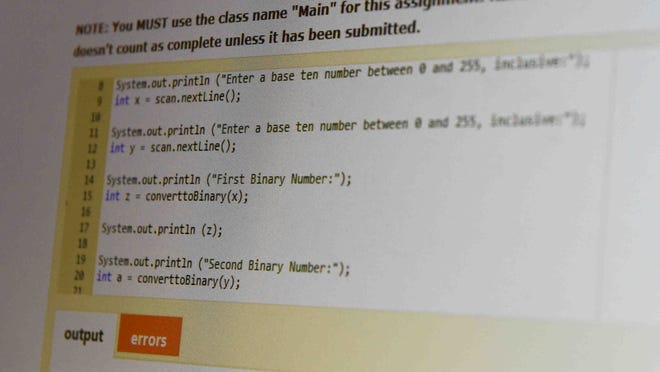Upon landing in the “land of opportunity” 22 years ago, I lost no time in starting a software company in Delaware called Tekstrom, Inc. Since then, Tekstrom has employed hundreds of engineers specializing in software testing methodologies and solutions that serve clients nationally and across our borders.
Americans with a degree in computer science and engineering or otherwise possessing relevant coding skills have been sought after for years because software applications have penetrated the world around us and had a deep impact on our lives. The ever-growing demand for skilled developers here and abroad has resulted in a scarcity of qualified personnel.

AP Computer Science could be a huge boost for students seeking technical skills that many future employers would be interested in.
This need-availability gulf is in no way exclusively an American reality. However, it has hurt us more due to our pioneering and leadership role in the computer software universe. Moreover, it has become clear to me that opportunities in these specialized computing fields are scarcer still in the African-American and Hispanic populations.
Why then have we failed to seal the gap? What are the barriers to their entry?
There are thousands of jobs paying top dollar that remain vacant in the software industry. Take a look at the US labor statistics: By the end of 2020, there were 1.4 million unfilled computer software jobs. Meanwhile, in the U.S. we graduate only 400,000 software specialists each year. Many positions are filled by foreign engineers, particularly by those who, like myself, come from India.
In addition, the pandemic paradoxically has upped the need for software and software workers while the enrollment of computer science undergraduate and graduate degrees students has fallen.
A family’s economic situation may not be responsible for everything in a child’s life, but it certainly has an impact. Many children of economically challenged minority individuals simply don’t have the guidance, network, financial stability and training to enter the software industry.
I decided to take the initiative and create a program that would help minority students enter the computing marketplace. I named it PROGRESS — Producing Real Opportunities by Giving Relevant Education in Software and Systems. Its structure and curriculum were born as a result of the input from many educators, colleagues and friends.
I also felt It was time for us Indian Americans, I told some in my social circle — especially those in the software industry — to give back to America, which has provided us the opportunity to work hard, grow and enrich our lives in many ways. We could make America better and stronger by helping African-American and other underprivileged, underrepresented populations to enter the software industry.
I reached out to colleagues and friends with this message, and they immediately and wholeheartedly agreed to help and contribute to PROGRESS. For instance, Rishi Potdar of Pennsylvania, Rajnikant Swain of Delaware, Dharamvir Dahiya of New Jersey, and Venu Madhav of India have passionately invested many hours during their tutoring sessions over Zoom — no monetary benefit involved.
I am delighted to report that the first 12-week PROGRESS training session ended successfully on Aug. 6. A small cohort of four internees, enrolled from Delaware State University, a historically Black university, after passing a web-based test to assess their learning potential, graduated successfully with the knowledge and hands-on skills presently in demand in the software testing field.
Thanks to Professor Marwan Rasamny, chairperson of DSU’s computer science department, who reviewed and evaluated the scope and intensity of the PROGRESS curriculum, all four graduates scored three academic credits toward their respective degrees. PROGRESS also paid a stipend of a thousand dollars to each student to keep them focused on participating and learning throughout the program.
The significance of much-needed “soft” skills such as resume building, interviewing, and how, when and where to apply for jobs was recognized and factored into PROGRESS as well. Interactions with successful professionals in these areas helped the trainees to understand the industry and career potential.
We also owe a debt of thanks to the corporate sector as well. Over Zoom, the four trainees interacted with and learned from Company Services Corporation Chief Technical Officer Kyle Sturgis, Executive Director of Tech Impact Patrick Callihan, and Syed Fazli, head of Automation Practice for Corelogic in Irvine, California, and former CTO at Bloomberg.
While PROGRESS has started small, we hope to increase the number of participants in each session to a maximum of ten. All internships in the future will remain free of charge,
The initiative would not have taken off without the help of State Sen. Bryan Townsend who introduced me to Rasamny, Kyle Sturgis and Patrick Callihan and encouraged me overall. I am optimistic that once the pandemic is behind us and awareness about the PROGRESS spreads, more academicians, community leaders and software managers will join the initiative.
For more information about PROGRESS or to participate, contact me at charan@tekstrom.com
—————
This column was published online by the https://www.delawareonline.com/ on Sept. 16, 2021.
Print edition was published on Sept. 19, 2021.



Recent Comments